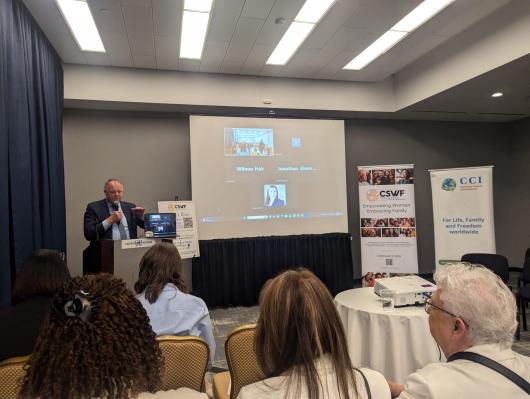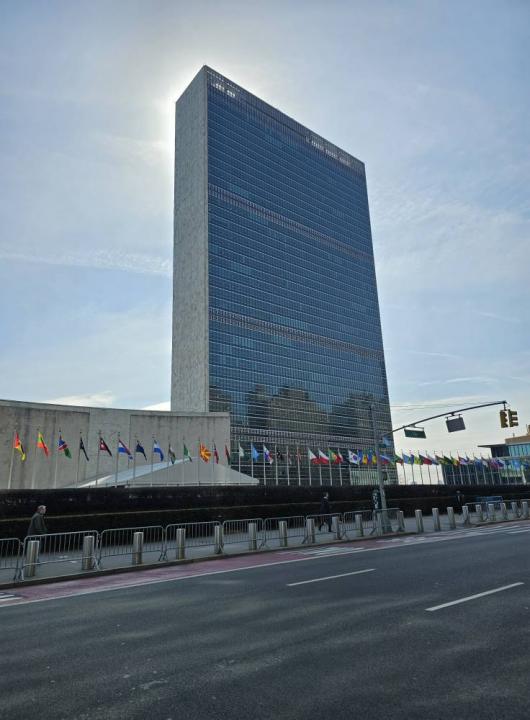
Reports on CCI United Nation Fellowship, March 10-14, 2025
The students were asked the following:
- Why should conservatives be involved in the UN?
- What is the state of free speech at the UN?
- What threats do we see on the state of women and the family?
Read here their stories:

Jacob Fox
My time at the United Nations representing Christian Council International showed me the desperate need for conservative voices standing up for national sovereignty and properly defined human rights on the world stage. At all of the UN committee meetings we attended at the 69th Commission on the Status of Women, there was both an echo chamber both within the panelists and among the room as a whole. There was no debate about making aid contingent on accepting abortion kits, or redefining key terms within the original Beijing resolution from 1995. I was shocked when panelists would equate women being deprived of education to women being only 40% of a country’s politicians. Countries were held to vastly different standards, yet all were demonized in some way.
CCI and the coalition of NGOs representing conservative perspectives are vital to breaking that echo chamber. They work to call out this “equity over equality” mentality that dominates the UN, advocating for freedom of opportunity for all people. I was in a meeting where I heard an ambassador say that governments need to legislate same wages for “comparable work,” using the example of truck drivers and nurses to illustrate “societal sexism.” Different wage prices prove that those two jobs are not comparable work; the predominant gender of those fields is not a determining factor in wage rates. But her legislative solution was indicative of the largest problem within the UN today: thinking that they know all complex social, political, and economic circumstances perfectly the world over, and therefore know exactly how to legislate a solution to form a perfect world. The power-hungry arrogance of some of the speakers I observed was truly sickening. Free speech is under attack at the UN as well.
I attended sessions at both the Conference on the State of Women and Family (CSWF) and a left-wing feminist conference. A micro-chasm of these two conferences could be seen before the question-and-answer period of each talk. For CSWF, the presenter gave a warning that all questions must be kept civil, meaning shouting or violence would not be tolerated. However, at the feminist conference, the presenter gave a warning that “any questions deemed hate-speech or in violation of the safe space created would result in removal from the conference.” The difference was stark; CSWF encouraged questions of any sort, as long as they were presented civilly and respectfully. The feminist conference, on the other hand, was worried about questions that would challenge their viewpoints. They saw speech as a dangerous tool of attack that should be regulated and punished as harshly as physical violence. The UN should be a forum where all ideas can be discussed, with open dialogue between people from all cultures and all worldviews. But that forum is weakening. We need strong conservatives like those in CCI to turn the tide and restore free speech.

Luke Sempsrott
It was not until the last night of the UN trip that what I had witnessed during the week set in. So often, the only source of information we consume on a daily basis is through the news and news alone. Since there is a physical disconnect between the news and us, there is also an emotional disconnect. But when you get the chance to hear what is typically on the news for yourself, it pierces the soul. The subtlety and casualness with which the UN delegates speak about their agenda is deeply unnerving. Their speech and supposedly-unbinding actions have ramifications felt around the world. But that does not stop them. Their proposals seek to unbind tradition and normality from society.
The most significant impact that my week at the UN had on me was the gradual understanding of just how much work there is to be done. It was very encouraging to attend the CSWF conferences and see the valuable efforts that fellow conservatives were putting in. Still, it did not detract from the infinitely larger looming forces from the progressive left. The battle for the UN is a war on words. Similar to how the introduction of the word “gender,” in Beijing in 1995, the definition and interjection of terms in UN documents is critical. The introduction of “gender” opened the door for the destruction of the family and the elimination of the two gender standard. Because it is a war on words, anyone can influence the outcome of the resolutions. All it takes is one conversation with the right person to put a dent in their agenda. That is why it is so important that conservatives be involved in the UN. We have a fighting chance. The more people involved, the more connections are made and more connections mean a higher chance of having a beneficial effect on the outcome of the UN. Unlike working in national politics, the resolutions have worldwide effects. For example, in Uganda, one of the poorest countries in the world, through the UN’s influence children were being paid l to be homosexual for $100 a month. $100 a month is a lot for a kid in the U.S., not to mention a kid in Uganda whose family struggles for food. And that is just one example. There are countless others where the UN and associated countries have misused their power to push a leftist agenda around the globe.
Yes, working in national politics does affect people, but advocating for change on an international level affects way more people. Conservatives have the opportunity to change the dominant agenda worldwide and that is an opportunity no one should ignore. However, there is some good news. A common thread throughout all the official UN side events was a tinge of despair and loss of hope. Although they can not directly reference it, almost everyone was upset about the Trump administration and the disbanding of USAID. Notably, at a smaller event titled “Pushback Against Gender Backlash” one of the female speakers said that this year “feels like a goodbye tour” due to the lack of funding. This note of despair for the leftists is a bit of hope for us conservatives. Even though it might seem that we are fighting an uphill battle, the fight for the reestablishment of pro-family and pro-life values is worth it.

Jonathan Evans
Growing up, I believed that the United Nations was an ineffective global body with little relevance to global politics. It seemed ridiculous that an organization with representatives from both Russia and Ukraine, Israel and Iran, and China and the United States could take united action on any issue. But during my fellowship through Christian Council International, I realized that, while the UN has little real power, it is able to shape the trajectory of social values and morality in other ways. This influence threatens conservative values worldwide. The progressive minority use the UN as a platform to push their agenda. They do this by placing vague or undefined language into general assembly documents. At CSW, terms like gender based violence, sexual and reproductive health rights, gender equality, and intersecting forms of discrimination were used constantly. This language is defined to include fringe progressive ideologies after a document containing it has been accepted. The phrase “sexual and reproductive health rights” includes the “right” to abortion, sex education, and gender transition therapy. “Gender equality” means promoting all gender identities, eliminating “unpaid care work” (raising children), and fifty percent female representation in every professional sphere.
These nations firmly believe in a post-modern, globalized world order that must guarantee complete human freedom, without consideration for moral and rightly ordered living. The underlying ideology seeks to eliminate conservative family values, gender roles, and moral frameworks. This agenda is embedded in every UN document and is leveraged against nations that depend on UN aid. Oftentimes developing nations sign onto these documents because they either do not know what the wording means, or because they lose vital aid by not signing. Our group met with ambassadors from two developing Christian nations, and both expressed facing immense pressure to accept progressive gender policies to receive UN funding. One member of parliament from an African nation told us how their country accepted funding from UNICEF for a year, not realizing that the organization had instituted comprehensive sex education and was paying children hundreds of dollars to engage in homosexual acts.
This fellowship has shown me that, while the UN may have little impact on the United States, it has substantial power to force progressive ideology into conservative nations that are less economically independent. An ambassador from a very poor African nation told our group that he has been forced to choose between violating his country’s Christian morals and allowing his people to starve. This ambassador, and many like him, are taking a brave stand, but face increasing political pressures to accept UN aid. It is vital that conservative voices are at the UN to resist and provide alternatives to this ideology. Conservatives can make an incredible impact, simply by encouraging delegates, and calling out these agendas before they are accepted. There are many of conservative nations and delegates who have not bought into the progressive agenda. Conservatives have an opportunity to support them and to show them that they are not alone in standing for what they believe.

Ellie Carson
Before attending this fellowship, I shared the common view that the United Nations was an ineffective corrupt organization, wasting taxpayer dollars. I believed its influence was marginal and that disengagement would be in the best interest of the United States. However, through my fellowship experience, I gained firsthand insight into the dynamics at play within the UN—particularly how its declarations and subtle use of language subvert conservative values. Through this Fellowship Sponsored by Christian Council International, I was able to attend official United Nations meetings and side events at the 69th Commission of the Status of Women. This year marked the 30th anniversary of the Beijing Declaration and Platform for Action, which was adopted by the UN in 1995 as a blueprint for furthering gender equality and women’s rights. In addition to the events hosted at the UN, I was able to attend the Conference on the State of Women and the Family, which offered the conservative perspective on many ideologies that are pushed within the UN.
This conference also functioned to reveal the how vague and deceptive language placed in UN declarations harms women and their families. For instance, the UN's use of the term “unpaid care worker” to describe mothers or other primary caregivers is not merely a semantic choice; it carries significant implications. While seemingly harmless when used to express the desire to “economically empower unpaid care workers to participate in the work force,” the phrase degrades the work of mothers and other familial care relationships. Replacing the word “mother” with “unpaid care worker” subtly undermines the irreplaceable role that mothers play in the development and well-being of her children. The adoption of this term is used to deemphasize the role and the sacrifices made by mothers and other familial care givers. This framing shifts the focus from the intrinsic worth of family love and care to the economic value of paid labor, discouraging women from seeing their role in raising children as valuable in its own right. Similarly, the phrase 'sexual and reproductive health and rights' may seem innocuous on the surface, but it serves as a gateway for policies that pressure countries into adopting controversial stances on issues like abortion and sex education. The terminology hides the radical agenda behind it, such as adoption of comprehensive sexuality education into schools, which encourages young adolescents to be sexually active, and removal of anti-abortion laws.
During this fellowship I witnessed this term being used to frame countries and policy makers which oppose the sexualization of children and uphold the sanctity of life as working against human rights. Given the influence of the United Nations, it's clear that conservatives cannot afford to abandon it. Although the United Nations does not have binding power, the declarations that it passes, such as the Beijing Platform for Action, influence international policy and are often cited as creditable sources for legislation debates around the world. It is imperative that we stand up for the importance of mothers, fathers, and families in places where such concepts are taboo. We need to push back against radical sexual ethics and the anti-life agenda that Western countries impose on those who are less powerful. It is our responsibility as conservatives to push back against the radical ideologies to ensure that our values have a voice in the global conversation.


